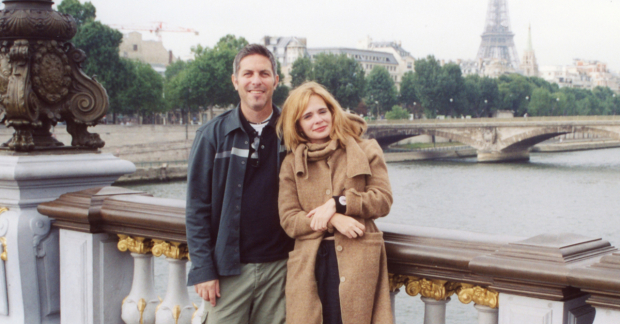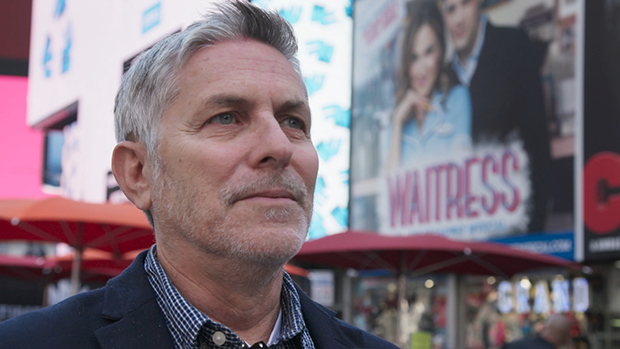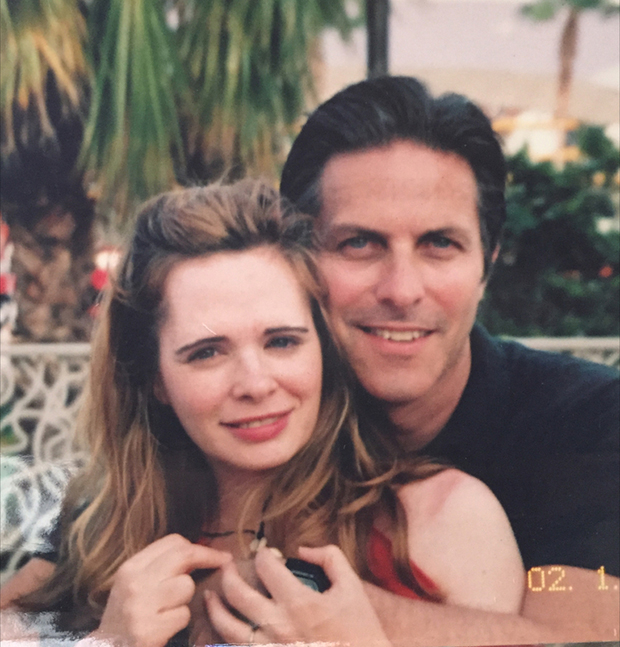In a New Documentary, Remembering the Legacy of Waitress Creator Adrienne Shelly
Adrienne Shelly was a vibrant actor, writer, director, and playwright who is the lesser-known force behind one of Broadway's biggest hits. Shelly wrote, directed, and co-starred in the 2007 film Waitress, which she would not live to see released. At 40, she was murdered in a senseless act of violence on the verge of finding out that the film had been accepted into the Sundance Film Festival.
I met Adrienne in 2001 when she started dating my friend, Andy Ostroy, whom she would later marry. From the minute I met her, I loved her. You couldn't not. She was full of quirks and positive energy and genuinely wanted to share her gifts with others. Their daughter, Sophie, was just a toddler when her mom passed.
Ostroy brings the story of his late wife to the screen in a new documentary called Adrienne, which will air on HBO beginning December 1. In the film, which Ostroy directed and produced, we learn that Adrienne was a talented artist as a child, starring in school plays, playing piano, and singing like a lark, and discovering her love of writing. Like so many artists in the '80s, the pull of New York City took her away from college before graduation and into the world of indie film and theater. Quickly, she was cast in a Hal Hartley film, The Unbelievable Truth and would go on to star in over 20 films. She skyrocketed to fame as a beautiful, talented, and complex actor and just as her rise to fame was gaining steam as a filmmaker, she was taken away.
In a recent conversation, Ostroy and I discussed Adrienne's life and legacy, and how he's spent the 15 years since her death continuing her work through the Adrienne Shelly Foundation. Without spoiling anything, the film is, I daresay, a harrowing and heartbreaking story of her life, death, and her husband's quest for truth which continues to this day. It's at once a story of Adrienne but also a story of a husband's love and ability to channel his grief into something much bigger than life itself.

(photo courtesy of Andy Ostroy via HBO)
This conversation has been condensed and edited for clarity.
There's a scene in the film where you ask people who are waiting in line to see Waitress on Broadway if they know who Adrienne is, and they don't. Did that sort of get the ball rolling on the documentary?
That moment confirmed for me what I'd suspected: that most people who go see Waitress don't know who Adrienne is. I wanted to make this film as a response to that. To make her universally known. Yet as you'll see Paul Rudd say late in the movie, an artist's ultimate success is when the work can succeed on its own even if people don't know who created it, or know the backstory. I can appreciate that now.
I did not realize Adrienne left stardom to start a theater troupe.
The interesting thing about her theater period is it came when she was at peak notoriety with the Hal Hartley films. The theater was an escape for her. She didn't want fame or stardom, so she retreated into theater. She created her theater company, Missing Children, as an opportunity to write, direct and produce her own work while also being able to cast her friends who were still struggling. She really started as a playwright. Serious Moonlight, the film I produced which she was shopping at the time of her death, was written like a play. Small, with few characters and locations. She wrote as a playwright and evolved from there.

(© HBO)
Did you ever, in your wildest dreams, expect Waitress to turn into a musical?
No. In fact, when I first learned of this, I thought, "This is where Waitress dies a slow death. Musicals are not easily executed and they're not for everyone. It's hard to sing and dance and be dramatic. I'd met early on with [producer] Barry Weissler and expressed my concerns. He said, "I will not do this unless I can do this the right way." He understood the tone of the film and how well it resonated with audiences. I watched over the years as he met with several writers and composers before finding the right team. When they sent me Sara Bareilles's music I thought, "This is it." And then Jessie Mueller was cast and I said, "She's going to sing this score?" I knew then the show would be a hit. No doubt whatsoever in my mind. And I started hearing Adrienne say, "This is what my film should be on Broadway."
You founded the Adrienne Shelly Foundation in the wake of her death as a way to support female-identifying filmmakers. How has the Foundation grown since you founded it, and how many women have you supported?
Over 100 filmmakers from all over the world. We're proud to have given a grant to Chloé Zhao, 2021's Best Director Oscar winner, early in her career when she was making short films. Dee Rees, Sarah Colangelo, and Penny Lane are a few others we've supported early on. Last year we started supporting playwrights as well. We have a partnership with Lookingglass out of Chicago, which is David Schwimmer's company. This was a natural evolution given Adrienne's history with theater.
What do you want people to know about Adrienne after watching the film?
I want people to know that she was a human being. That she was more than just a murder victim. That she was a person – a wife, a mother, a daughter, a sister. Adrienne inspired so many whom she knew and worked with in her short life. Her ultimate legacy is that she broke through barriers as a female filmmaker and brought light to female voices. The film helps us understand who she was and will hopefully inspire viewers to go back to discover her films and appreciate her unique voice as an artist.

(photo courtesy of Andy Ostroy via HBO)










